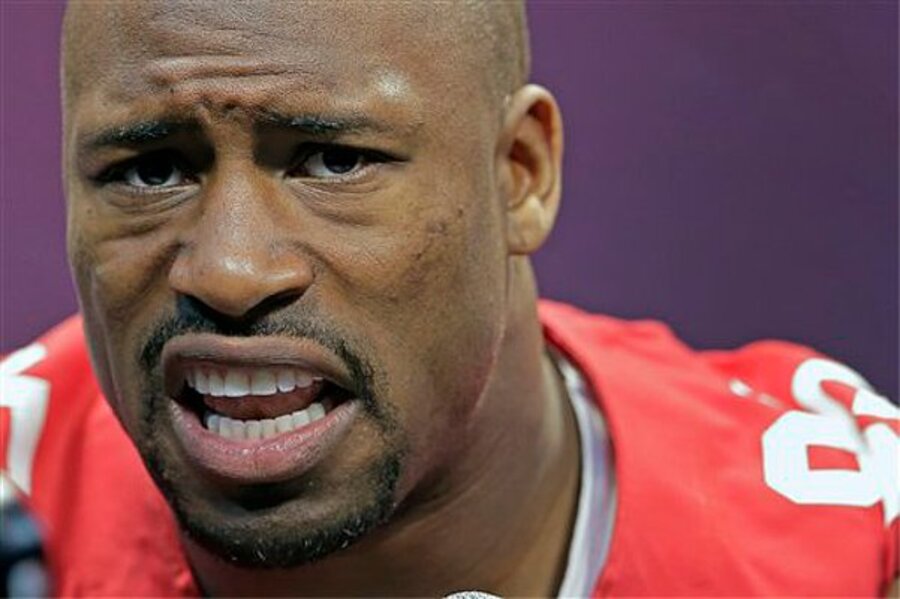Super Bowl 2013: Is 'flag football' ahead for the NFL?
Loading...
| NEW ORLEANS
Making the game safer is making NFL players unsure what's a legal hit.
Players on both Super Bowl teams say they are confused about which hits are considered clean and which ones could lead to a fine. And it's not just the guys on defense who are wondering about the future of pro football.
"I think the rules will change a lot," San Francisco 49ers tight end Vernon Davis said Tuesday. "There's already no helmet to helmet. Might be flag football, maybe."
Baltimore Ravens safety Bernard Pollard, one of the league's hardest hitters, warned against trying to take collisions out of the game, as long as they are clean.
"You can't play this game and not expect it to be physical," said Pollard, who was fined $15,250 for a hit on Patriots receiver Wes Welker in the AFC championship game that Pollard believes was within the rules. "There will be injuries in football. There's a car crash on every play."
His 49ers counterpart, All-Pro Dashon Goldson, says defenders keep this in mind when they take the field:
"Do your best and then hope you don't get a letter (with a fine) in your locker on Wednesday."
The NFL has sought to eliminate any hits to the head and neck area of defenseless players, particularly in the last three years. It also has banned players launching themselves helmet-first toward an opponent.
Yet, every week, players are fined for those actions, and there have been suspensions. Baltimore safety Ed Reed drew a one-game suspension this season that was lifted by the NFL on appeal and turned into a $50,000 fine for repeated illegal tackles. The 5-foot-11, 205-pound Reed is not considered a vicious hitter.
Reed admits he can't be sure what's a true tackle these days and what crosses the line.
"A lot needs to be done with it. I don't think every fine is right," he said. "You have to go back and really look at how guys play the game before you judge them, is what I'm trying to say."
While still recognizing the importance of keeping games as safe as possible, defensive players have complained for years about the league's crackdown on hits. The 49ers and Ravens have two of the most physical defenses in the NFL, and they are proud of their violent nature.
"You can't play timid," Goldson said.
But even offensive players concede that defenses are at a disadvantage to the point of confusion.
Baltimore's Anquan Boldin, one of the more physical wide receivers in the league, doesn't feel sorry for anyone trying to tackle him. But he understands their plight as they close in.
"All defensive players have to deal with that," Boldin said. "It's tough on defensive players on those defenseless receiver calls because they come in and then the receiver drops his shoulder and they hit in the (head). And they get a penalty.
"So maybe they aren't sure and that's bad. This game is played too fast to worry about that, but they do have to worry."
The NFL isn't going to back down on its emphasis on player safety, of course. It is facing at least 175 lawsuits as more than 3,800 players have sued the league over head injuries as the concussion issue has gained attention in recent years. The total number of plaintiffs is 6,000 when spouses, relatives and other representatives are included.
So the emphasis on eliminating what Ray Anderson, the league's main disciplinarian, calls "egregious fouls" will remain.
"We will just not let up," Anderson told The Associated Press on Tuesday. "Get used to it, this will be our mantra: We have an obligation in being relentless in protecting our players.
"If they are in a defenseless position, hitting in the helmet is unnecessary. We said player health and safety is our No. 1 priority from the get-go and we have stuck to it with no apologies and no defensive attitude about it."
Meantime, as offenses make scoreboards spin with record numbers of points, defenses try to figure out exactly what they are allowed to do.
"We are guys who are supposed to hit," said 49ers safety Donte Whitner, who is known for his bone-crunching tackles. "We have to bring the element of fear when they come over the middle. We want receivers to think do you really want to keep coming over the middle time and time again.
"We need to make sure they don't want to, but we need to do it the right way. But we need to figure out the right way."







